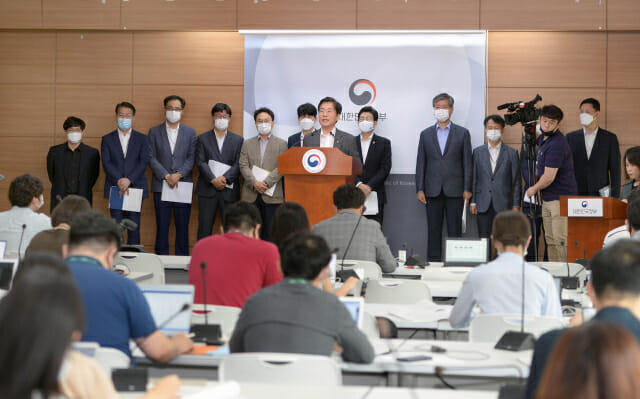
The Ministry of Industry will invest 5 trillion won to reorganize the global supply chain (GVC) for the new year, revitalize new industries such as R&D and Big 3 (system semiconductors, future cars, and bio), and to realize the Green New Deal and 2050 carbon neutrality.
On the 29th, the Ministry of Trade, Industry and Energy announced on the 30th the ‘2021 Industrial Technology Innovation Project Integrated Implementation Plan’ containing a plan to support industrial technology R&D worth KRW 4.9518 billion.
The amount of R&D support from the Ministry of Industry increased from 3 trillion KRW in 2019 to 5 trillion KRW in two years.
The Ministry of Industry announced that in the new year, it has continued to expand investments in the existing materials, parts and equipment sectors and three new industries for innovative growth, while further strengthening investments to realize carbon neutrality in the Korean version of the Digital New Deal and the Green New Deal.
The Ministry of Industry, first of all, will invest 1.555 trillion won, a 21.8% increase from this year, in R&D for the entire life cycle of the general manager, from technology self-reliance and commercialization linkage to core item technology in line with the move to reorganize the general manager’s GVC.
866 billion won for material parts technology development, 195 billion won for technology development foundation for materials and parts industry, 9.7 billion won for global investment-linked technology development for materials and parts, 9.3 billion won for technology development for material parts and equipment innovation lab, technology for re-emergence in the steel industry It allocated 16.7 billion won for development.
Innovative growth new business (Big 3) that will lead future growth foods such as system semiconductors, future cars, and bios will invest 9665 billion won, a 43.4% increase from this year.
Next-generation intelligent semiconductor technology development (design, manufacturing) KRW 63.7 billion, automobile industry technology development KRW 155.6 billion, bio-industrial technology development KRW 110.7 billion, strategic product creation, global K-fabless development technology development KRW 6 billion, super safety It will invest 6 billion won in the development of core technologies for driving platforms and 15.1 billion won in the development of national new drugs.
It allocated 231.8 billion won, an increase of 18.2% from this year, to a digital new deal to transform into a digital-based economic system through advancement of non-face-to-face core technology and DNA (data, network, AI).

7.3 billion won for bio-based big data construction pilot project, 9.6 billion won for 5G-based high-tech manufacturing robot demonstration base construction (robot industry technology development history), 6.8 billion won for national reference standard data development and distribution (national standard technology development and distribution history), service 21 billion won will be invested in core technology development (core technology development in the knowledge service industry), 7.6 billion won in the industry intelligence leading value chain development project, and 6.3 billion won in the advancement of reliability technology for automotive electronic components based on big data.
In order to realize ‘2050 carbon neutrality’ such as energy efficiency, activation of hydrogen economy, and diffusion of new and renewable energy, the Green New Deal and carbon neutrality (Net Zero) are investing KRW 8592 billion, an increase of 15.5% from this year. It allocated 527.2 billion won to the Green New Deal and 332 billion won to carbon neutrality.
Specifically, KRW 283.9 billion will be invested in the development of core technologies for new and renewable energy, KRW 214 billion for the development of core technologies for energy demand management, and KRW 9.1 billion for the clean production-based industrial symbiosis technology development project. As a new business, 8.6 billion won for the establishment of the basis for large-scale CCS integration demonstration and commercialization of CCUs in the multi-ministerial field, 4 billion won for the development of technology to reduce greenhouse gas and fine dust in the manufacturing field, and development of decarbonization supply technology for breakthrough limit (renewable energy core technology development history) ) And 11 billion won (6 tasks) for NetZero’s industrial innovation infrastructure construction (industrial innovation infrastructure construction details).
In addition, the company will invest in revitalizing the local economy (286 billion won), such as a workforce training project (155.4 billion won) to effectively respond to the deterioration of employment due to the economic crisis, and the establishment of an R&D infrastructure to strengthen regional-oriented innovative growth capabilities.
The Ministry of Industry, Inc., discloses the contents of industrial technology R&D projects in 2021 on the website of dedicated organizations such as the Korea Institute of Industrial Technology Evaluation and Planning, and on January 19 of the new year, on January 19, 2021 industrial technology R&D was held at an online’Ministry joint briefing session (sponsored by the Ministry of Science and ICT) The project implementation plan will be explained.
Related Articles

“To build 110 hydrogen charging stations next year, 40% tax credit for semiconductor R&D”

Next year’s government R&D budget of 27.4 trillion won… 13.1% increase over this year

Director Myung-hee Myung-hee, “Expanding customized support for cooperation U-turns, high-tech industries, and R&D”

Ministry of Environment to hold’Environmental R&D·New Technology Performance Presentation’ by the 24th of next month
In addition to funding for research, the Ministry of Industry plans to continue improving the system to reduce unnecessary interference to researchers and promote autonomy. In particular, the R&D sandbox track is applied to excellent research institutes to collectively exempt R&D regulations such as target change and project cost transfer.
Minister of Industry Sung Yun-mo said, “Since the first commercialization of secondary batteries in 1991, it has become a game changer that inspires innovation in major industrial sectors such as new and renewable energy and future vehicles through ESS and electric vehicle batteries.” He predicted that 30 years of time is a period of technology realization and innovation that is not currently imagined, and ‘2050 carbon neutrality’ can also be realized through technological development in various fields.”
